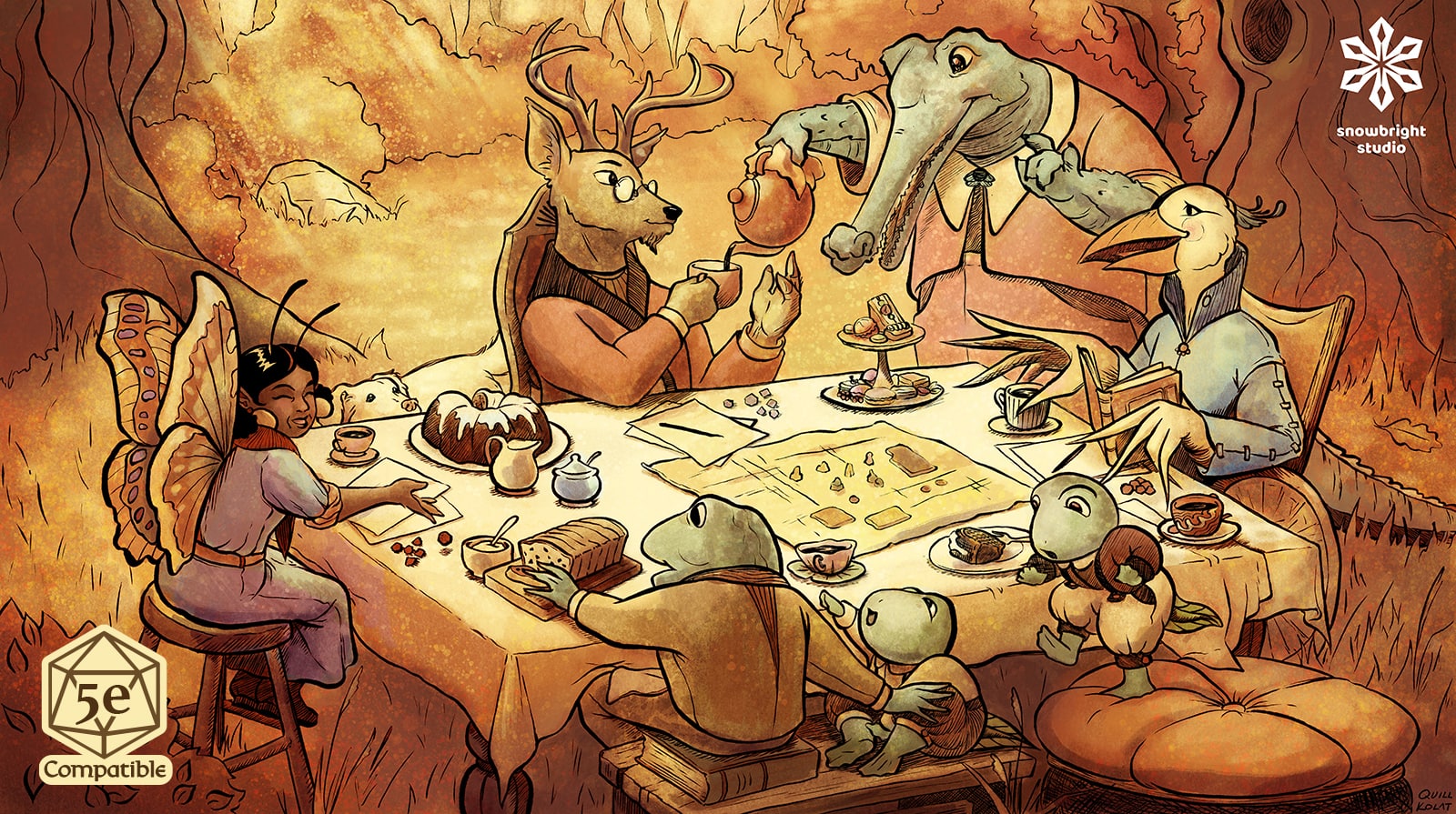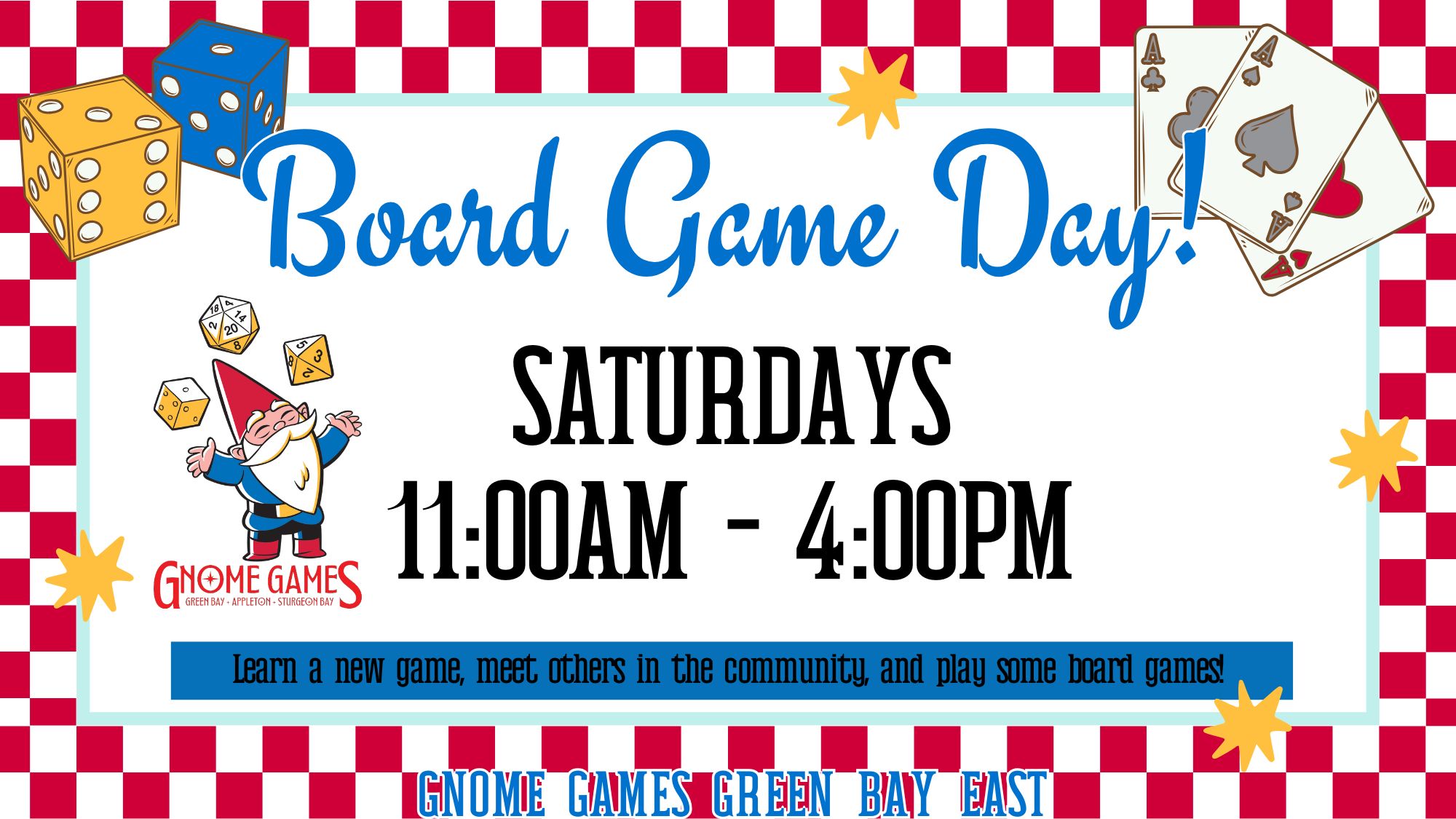
Digimon! Digital Monsters! Gnome Games! Saturdays! Exclamation points!
Each Saturday, Gnome Games Green Bay East invites Digimon players to join us for 3 rounds of play! DIGIMON CARD GAME from Bandai comes replete with promos and prizes!
These will be Store tournaments with decks constructed under official rules and ban lists: RULE|DIGIMON CARD GAME
“A tournament legal deck consists of:
● a main deck of 50 cards, made up of Digimon, Tamer, and Option Cards;
● a Digi-Egg deck of 0-5 cards.
No more than four copies of the same card can be included in a deck. No side decks are permitted.
You must also bring a memory gauge and counter. Each player should track memory to avoid the sharing of materials.”
Best-of-three Game Match
Number of game wins necessary: 2
Match Time: 45 minutes
Check our calendar for special Digimon events that happen around releases and special occasions!

Digimon! Digital Monsters! Gnome Games! Saturdays! Exclamation points!
Each Saturday, Gnome Games Green Bay East invites Digimon players to join us for 3 rounds of play! DIGIMON CARD GAME from Bandai comes replete with promos and prizes!
These will be Store tournaments with decks constructed under official rules and ban lists: RULE|DIGIMON CARD GAME
“A tournament legal deck consists of:
● a main deck of 50 cards, made up of Digimon, Tamer, and Option Cards;
● a Digi-Egg deck of 0-5 cards.
No more than four copies of the same card can be included in a deck. No side decks are permitted.
You must also bring a memory gauge and counter. Each player should track memory to avoid the sharing of materials.”
Best-of-three Game Match
Number of game wins necessary: 2
Match Time: 45 minutes
Check our calendar for special Digimon events that happen around releases and special occasions!

Digimon! Digital Monsters! Gnome Games! Saturdays! Exclamation points!
Each Saturday, Gnome Games Green Bay East invites Digimon players to join us for 3 rounds of play! DIGIMON CARD GAME from Bandai comes replete with promos and prizes!
These will be Store tournaments with decks constructed under official rules and ban lists: RULE|DIGIMON CARD GAME
“A tournament legal deck consists of:
● a main deck of 50 cards, made up of Digimon, Tamer, and Option Cards;
● a Digi-Egg deck of 0-5 cards.
No more than four copies of the same card can be included in a deck. No side decks are permitted.
You must also bring a memory gauge and counter. Each player should track memory to avoid the sharing of materials.”
Best-of-three Game Match
Number of game wins necessary: 2
Match Time: 45 minutes
Check our calendar for special Digimon events that happen around releases and special occasions!

Digimon! Digital Monsters! Gnome Games! Saturdays! Exclamation points!
Each Saturday, Gnome Games Green Bay East invites Digimon players to join us for 3 rounds of play! DIGIMON CARD GAME from Bandai comes replete with promos and prizes!
These will be Store tournaments with decks constructed under official rules and ban lists: RULE|DIGIMON CARD GAME
“A tournament legal deck consists of:
● a main deck of 50 cards, made up of Digimon, Tamer, and Option Cards;
● a Digi-Egg deck of 0-5 cards.
No more than four copies of the same card can be included in a deck. No side decks are permitted.
You must also bring a memory gauge and counter. Each player should track memory to avoid the sharing of materials.”
Best-of-three Game Match
Number of game wins necessary: 2
Match Time: 45 minutes
Check our calendar for special Digimon events that happen around releases and special occasions!

Welcome to the world of the Verdant Isles! 
Join us at Gnome Games Green Bay East for a cozy, nonviolent role playing game full of heartwarming magic, baked goods, and friendship.
Whether you’ve never played a tabletop role playing game before and you’re looking to get started, or you’re a seasoned Dungeons & Dragons veteran just looking for a change of pace, grab your favorite mug and enjoy some freshly brewed tea as we embark on a brand new adventure.
Entry is $10, and complimentary tea will be served!
We encourage you to bring your favorite mug and get cozy as we explore the Verdant Isles.
This event is beginner friendly and open to all ages.
Check out this event at Gnome Games Green Bay East and more here!
Follow Gnome Games Green Bay East Social Media to get all the Gnome Games news!

Welcome to the world of the Verdant Isles! 
Join us at Gnome Games Green Bay East for a cozy, nonviolent role playing game full of heartwarming magic, baked goods, and friendship.
Whether you’ve never played a tabletop role playing game before and you’re looking to get started, or you’re a seasoned Dungeons & Dragons veteran just looking for a change of pace, grab your favorite mug and enjoy some freshly brewed tea as we embark on a brand new adventure.
Entry is $10, and complimentary tea will be served!
We encourage you to bring your favorite mug and get cozy as we explore the Verdant Isles.
This event is beginner friendly and open to all ages.
Check out this event at Gnome Games Green Bay East and more here!
Follow Gnome Games Green Bay East Social Media to get all the Gnome Games news!

Welcome to the world of the Verdant Isles! 
Join us at Gnome Games Green Bay East for a cozy, nonviolent role playing game full of heartwarming magic, baked goods, and friendship.
Whether you’ve never played a tabletop role playing game before and you’re looking to get started, or you’re a seasoned Dungeons & Dragons veteran just looking for a change of pace, grab your favorite mug and enjoy some freshly brewed tea as we embark on a brand new adventure.
Entry is $10, and complimentary tea will be served!
We encourage you to bring your favorite mug and get cozy as we explore the Verdant Isles.
This event is beginner friendly and open to all ages.
Check out this event at Gnome Games Green Bay East and more here!
Follow Gnome Games Green Bay East Social Media to get all the Gnome Games news!

Welcome to the world of the Verdant Isles! 
Join us at Gnome Games Green Bay East for a cozy, nonviolent role playing game full of heartwarming magic, baked goods, and friendship.
Whether you’ve never played a tabletop role playing game before and you’re looking to get started, or you’re a seasoned Dungeons & Dragons veteran just looking for a change of pace, grab your favorite mug and enjoy some freshly brewed tea as we embark on a brand new adventure.
Entry is $10, and complimentary tea will be served!
We encourage you to bring your favorite mug and get cozy as we explore the Verdant Isles.
This event is beginner friendly and open to all ages.
Check out this event at Gnome Games Green Bay East and more here!
Follow Gnome Games Green Bay East Social Media to get all the Gnome Games news!

Welcome to the world of the Verdant Isles! 
Join us at Gnome Games Green Bay East for a cozy, nonviolent role playing game full of heartwarming magic, baked goods, and friendship.
Whether you’ve never played a tabletop role playing game before and you’re looking to get started, or you’re a seasoned Dungeons & Dragons veteran just looking for a change of pace, grab your favorite mug and enjoy some freshly brewed tea as we embark on a brand new adventure.
Entry is $10, and complimentary tea will be served!
We encourage you to bring your favorite mug and get cozy as we explore the Verdant Isles.
This event is beginner friendly and open to all ages.
Check out this event at Gnome Games Green Bay East and more here!
Follow Gnome Games Green Bay East Social Media to get all the Gnome Games news!

Gnome Games Green Bay East invites you to play games at the table!
Open Play Board Games available to play! Bring your families and friends, grab a table and a game and have some fun!
Starts at 11am
Tons of board games to play in our library or bring your own!
We also have Gnomes who will be demoing games so check out our social media for sneak peaks at what might be the featured game!




